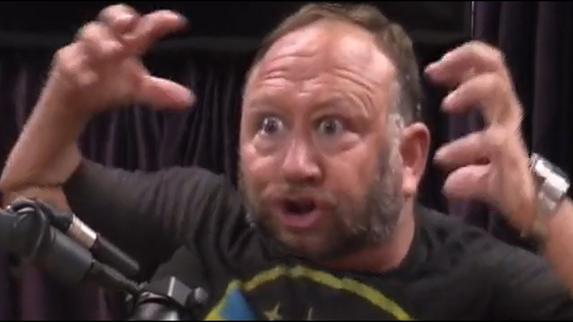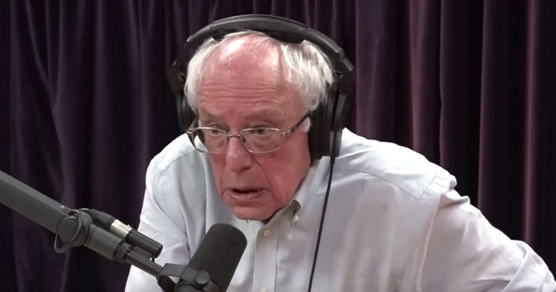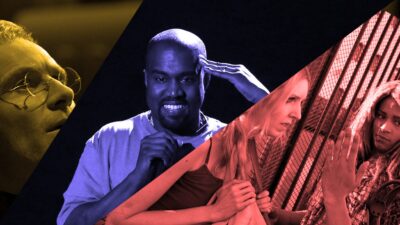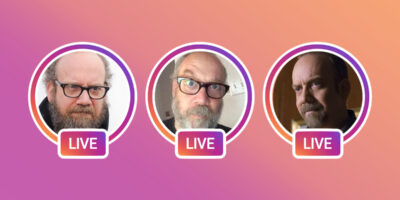Joe Rogan is probably not a good person. It’s not so much that I think he’s personally mean to his wife and kids, or that he treats his friends badly, or anything like that, it’s just that he’s had too many fascists on his podcast to really give him a break for anything. I don’t know the man, I’ll never meet him, but it definitely feels like I know him, and it’s impossible not to be disappointed in who he’s chosen to be on his podcast. Rogan may feel like he’s mostly just the “Have you ever tried DMT, bro?” meme to the people who’ve never listened to him, but to the millions of people who tune in to his show, he is so, so much more. THE JOE ROGAN EXPERIENCE is the defining podcast of this decade, it’s held on to the number one spot on the iTunes charts for years, and there’s no sign of it going anywhere. No one else figured out how to use the free wheeling, spontaneous format as effectively as Rogan did. Over the past 10 years, he found a completely new way to do talk radio, to break from all the tired gimmicks he inherited from Howard Stern and Opie and Anthony, and make some of the most compelling, seemingly dangerous content on the internet. In reality, Rogan was largely just rebranding the same cultural hegemony that’s always dominated American pop culture, but it took a long time to realize that, or at least it took me a long time to figure it out.
I’m often embarrassed to admit how much time I spent listening to Rogan, but from mid-2013 until late 2015 I was an avid listener; it was the only podcast I listened to consistently. Before THE JOE ROGAN EXPERIENCE, sure, I was really into THIS AMERICAN LIFE and RADIOLAB, but neither show could even compare to how all consuming the JRE was. Rogan releases multiple episodes a week, each episode is usually over two-and-a-half-hours long, and I listened to almost every episode released during that period. When I first got into his show, it felt like a portal to a whole new world had been opened. There were no ad breaks, no corporate executives censoring the show, there was just Joe getting stoned and talking to a guest. And the guests he had were wild; he would have anti-war reporters like Abby Martin on, he would have the craziest conspiracy theorists, and he would have truly uncensored comedians. The show felt like an opportunity to escape normal, boring people and hang out with your friend Joe while he talked to those who were truly from a different planet. It was more entertaining than 90% of television, there were times I could’ve watched a movie and decided to listen to Rogan instead, it was totally immersive, free content that you could swim in forever. It was the pinnacle of podcasting, it seemed. The utopian promise of the internet as a wild and free terrain felt like it was being fully realized when you tuned in.
Of course, a lot of Rogan’s guests were people dealing in half-truths at best. In particular, he always had a long relationship with Alex Jones, and would allow Jones to come on the show to spout conspiracy theories for hours. Jones, of course, at this point is widely known as part of the internet pipeline to white supremacist thought, but at the time when I first heard him on Rogan’s show, I thought he was just a guy who was saying some wacky shit about 9/11 and FEMA camps. That sense that you were getting “real” people sharing “dangerous” ideas felt deeply intoxicating as the show continued to become more popular.

Real and dangerous
Even as a skinny vegetarian and budding socialist, it was hard not to be enamored with Rogan’s no-bullshit approach to dunking on people who seemed to care too much about irrational things. After all, it felt like a way to check myself and my “liberal bubble” by listening to people who were perceived as more honest than it felt like most media outlets were really allowed to be. Getting the “honest, real world” perspective outside my college campus seemed to be a good reality check. Of course, Rogan rarely had women on his podcast, only occasionally had people of color on his show, and the only time he had a trans person on his podcast was the very controversial trans male porn star Buck Angel, whom Rogan had on explicitly to get support for his position that trans women shouldn’t be allowed to fight in the UFC. (Rogan has made a lot of transphobic comments over the years, and trans people are absolutely correct to criticize him for those.)
It wasn’t until I had been listening for a few years that it slowly started to dawn on me how strange it was that an extremely successful comedian in his late-‘40s was so concerned about what 19-year-olds on college campuses were saying and thinking. Rogan isn’t alone in indulging in this irrational fear, Jerry Seinfeld is also stupidly obsessed with what college students think of him, and Rogan’s frequent guest Ben Shapiro also enjoys using his Harvard law degree to bully undergrads. Rogan is really just reflective of the wider, conservative knee-jerk reaction against mild requests for social justice from young people, but it’s extremely telling how much time and energy Rogan has spent trying to make fun of snowflakes for being triggered, while trying to act as though he’s above it all.
Of course, I’m sure Rogan’s defenders would be quick to point out here that he’s regularly had the black comedian Ms. Pat on his show, but it’s still hard to ignore the fact that in the aggregate, a show with this level of popularity based on spreading “dangerous ideas” isn’t really particularly interested in showcasing a diversity of thought. The types of thinkers Rogan did decide to begin hosting on his show around 2015 were what ultimately got me to stop listening for good. I remember so vividly listening to this weird guy named Milo Yiannopoulos talk a mile a minute on the JRE for almost three hours straight and feeling flooded with increasing dread. This asshole was spouting ideas that on their face were absolutely abhorrent, and I was stunned that Rogan was doing almost nothing to push back against him. In particular, I vividly recall Milo admitting to being abused by a priest as a teenage boy, but claiming that he was the one who pursued the priest, and Rogan didn’t interrogate that claim further. Milo’s bizarre comments that some young gay men actively pursue relationships with older men would eventually get him into hot water and somehow be the thing that finally pushed him out of the good graces of the various fascists who came to love him between ‘15 and ‘17, but I was deeply disturbed that Rogan seemed willing to just move on from these comments without question. I knew at that point that I was done with the show, but clearly I was in the minority, as Rogan continued to get more popular.

*Sigh*
At the time, I was getting concerned about the types of thinkers Rogan was having on the show at large. In particular, it’s become alarming just how much air time Rogan gives to not only Alex Jones, but also Sam Harris, Jordan Peterson, and Ben Shapiro. The “intellectual dark web” that has made itself so popular on right-wing YouTube has without a doubt been able to substantially boost its presence online due to its members’ frequent appearances on Rogan’s show. Sam Harris had long been a staple of the show, a man known for parlaying his expertise in neuroscience into a license to talk about why we need to wipe out the entire Muslim world. Ben Shapio is a conservative writer and YouTuber who has several connections to white supremacists and refuses to acknowledge his role in influencing multiple mass shooters. Jordan Peterson has been linked to being a major influence for neo-Nazis. And to top it all off, Alex Jones is Alex Jones, someone who has become even more openly fascist since Trump got elected, but whom Rogan still has on his show. These men are Rogan’s most popular guests, it makes perfect sense why he would continue to have them on to maintain his position as the most popular podcast in the world, and yet it’s very difficult to tolerate his decision to continually platform these people with demonstrably dangerous ideas time and time again.
At a certain point, the popularity of THE JOE ROGAN EXPERIENCE is just one more example of how the promise of the internet has failed us all. “The free marketplace of ideas” long ago revealed itself to be rotten, and Rogan isn’t personally responsible for the broken YouTube algorithm that rewards hard-right content with better traffic, but he is undeniably a beneficiary of the nasty waters we’ve all found ourselves treading in for the last few years. After listening to him for so long, I know he is ultimately incapable of looking at his own choices and the role he plays in fomenting these awful ideas that continue to spread like wildfire through the internet. As a “straight shooter” who “calls it like he sees it,” Rogan thinks of himself as somehow separate from the rest of political culture, despite arguably having a more influential platform than any individual Fox News or MSNBC host. I wouldn’t go so far as to call Rogan unintelligent, but I can confidently say that admitting to his own faults and limitations is not something he does easily, and that lack of introspection has clearly allowed him to barrel along while platforming terrible people.
Of course, the thing that’s really so maddening about Rogan is that you can’t just entirely write him off as a fascist sympathizer. Realistically, he’s what I would call a “galaxy-brain libertarian”: someone who can go on and on about how we’re all just apes on a spec of dust in a vast universe and we should all be better to each other, before quickly getting enraged because he encountered someone who doesn’t eat meat and cheese. It’s surface-level politics that rarely engages with critical thinking about the wider power dynamics around us, but it’s not explicitly calling for the extermination of minorities, either. Rogan has recently had Cornel West and Bernie Sanders on his show, both of whom he treated with respect and who got an unparalleled opportunity to spread their ideas to people who would otherwise never engage with them. I’m very glad that Edward Snowden got to appear on the show and speak at length about the ways in which our data is being used against us by the NSA. As I’m writing this, Rogan just mentioned to Bari Weiss that he plans to support Bernie Sanders, which I have to admit is gratifying to hear. For all of Rogan’s obvious baggage, it is undeniable that a huge amount of eyes and ears are tuned in to him; to have him endorse a candidate who substantially feels like a radical break from tradition feels important. We’ve entered a new era where people communicate and think very differently, Rogan is an essential part of that, and winning over his audience, despite all the awful ideas they might have indulged in through Joe’s show, feels like a major victory.

*Warren voters’ typing intensifies*
THE JOE ROGAN EXPERIENCE was so monumentally successful this decade because Rogan was very good at flowing with the internet communities dominated by white males and reflecting them back to themselves, feeding them exactly what they want and telling them it’s dangerous and radical. He doesn’t have to be a white supremacist, apocalyptic gun nut, or anti-Semetic conspiracy theorist to benefit from having those people on his podcast, but calling him outright evil feels like a stretch. All that being acknowledged, however, there’s something undeniable about the promise of the JRE. A guy who was moderately famous for hosting reality TV and doing stand-up comedy built a media empire just by having interesting people on his podcast and having them speak in an unfiltered format. Anyone can do that, and plenty of people already are. Audiences clearly respond to that approach, and that means that it’s still possible for other podcast hosts (with better instincts for who they do and don’t invite on their show) to build something just as effective as the JRE. Just because Rogan remains at the top now doesn’t mean he will forever; other people are already figuring out how to do what he does and make it more inclusive, funnier, and smarter.
Perhaps even more important is the realization that the internet’s real power is its ability to carve out an infinite variety of niches. In another 10 years, Rogan may be significantly less popular, not because he’s been usurped by a single podcast, but rather because dozens and dozens of podcasts have splintered his audience. Of those podcasts, sure, some will probably be more openly reactionary, but others will simply focus on some of the many things that bring people to Rogan’s show while not engaging in so many noxious ideas. I also have to admit that I ultimately don’t regret the years I spent listening to the show—it exposed me to a handful of really fascinating people (check out his interview with Freeway Ricky Ross some time), and it also exposed me to a lot of ideas I was able to ultimately reject while I was in college and figuring myself out. Not everyone who engages with the awful sides of Rogan’s show ends up agreeing with his worst guests; plenty of people can look at the ideas presented and decide they’re not worth much. As much as this felt like the decade in which the internet took an especially sinister turn, it really doesn’t take a huge leap of the imagination to see us collectively course-correcting as we blunder ahead into the new decade. A better world is still possible through podcasts, even if it rarely feels like it these days.
















Comments